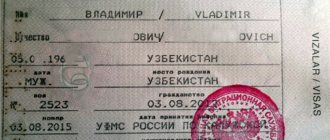Deregistration at the place of residence is a procedure that must be carried out in compliance with all legislative norms in this area.
Deregistration at the place of residence
Legislative regulations provide for mandatory procedures for various types of proceedings. Our task is to determine what types of deregistration at the place of residence are available, and how to carry out the procedure without violating the Law.
Return to contents
What is a place of permanent registration?
Before discussing registration at the place of residence, you should understand what constitutes a place of registration.
This is the property on which you and your family live permanently or primarily. The process is called “registration”, which is indicated by a mark in your passport.
Its role is sometimes performed by a special document with the seal of the Main Directorate for Migration Issues of the Ministry of Internal Affairs.
If you intend to move to another place that will serve as your primary place of residence, then you and your family members, if any, should re-register for a new living space.
The term “Deregistration” is often replaced by the synonym “extract”.
Return to contents
Video: how to register at your place of stay.
Return to contents
Sample application for discharge at the place of residence
The application form for deregistration at the place of residence is as follows:
Example 1:
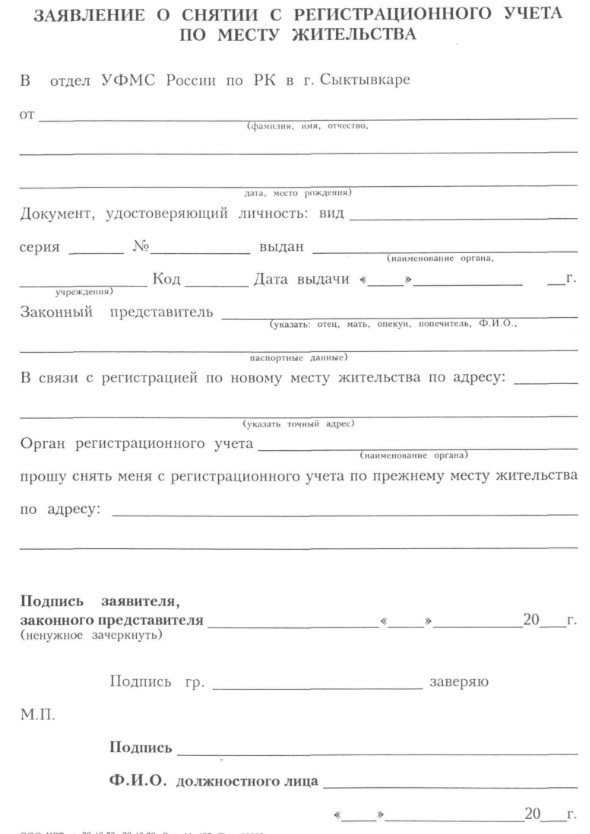
Example 2:
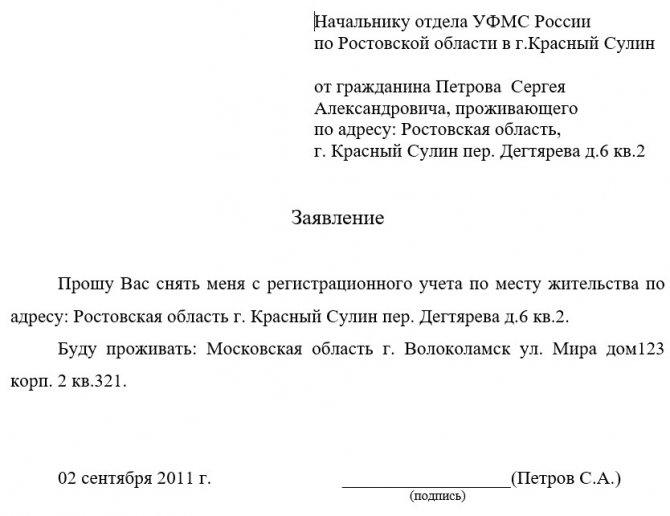
Application form for discharge due to death:
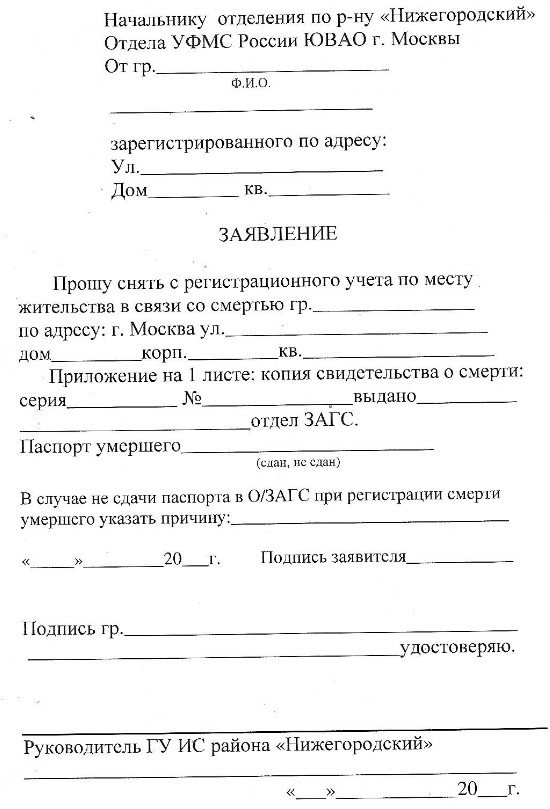
This simple form of application for discharge at the place of residence will do by hand:
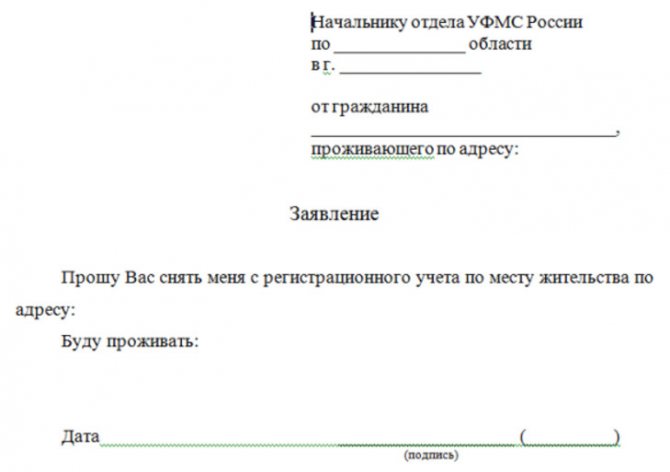
Design example:
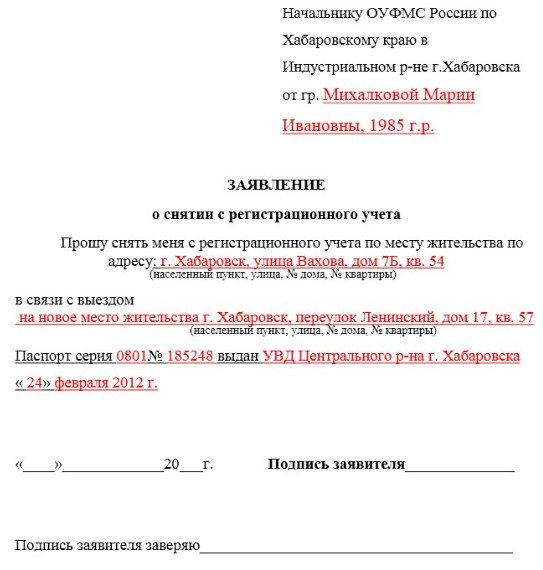
What methods of discharge are possible?
The procedure is regulated by Order of the Ministry of Internal Affairs of the Russian Federation No. 984.
It also discusses two legal methods:
- Deregistration upon request. We are talking about those cases when people change their registration without first checking out of their previous living space. Simultaneously with the new registration, they can request an extract from their former place of residence.
- Cancellation of registration before departure.
Lawyers recommend using the first method whenever possible, as it eliminates the risk of violating the Law regarding deadlines.
Once you are discharged, you only have a week to re-register.
If you do not do this, you will have to pay a fine of 2 thousand.
The amount depends on the circumstances of the delay and the region. This method is also acceptable for the reason that you will not need to waste time going to migration services, waiting in queues and, in addition to time, wasting your nerves and health.
When choosing the first option, the date of discharge will be considered the day of new registration.
Return to contents
Which authorities should I contact?
Regardless of whether a child or an adult is being discharged, you need to contact the following services:
- a passport office, the service area of which includes a house where registration will be carried out or a home from which a family or individual citizen intends to check out before leaving for a new place;
- GUVM department;
- Public services;
- MFC.
It is important to know that all matters related to the registration or deregistration of citizens, both Russians and foreigners, are in charge of the migration service.
Other authorities involved in collecting documents transfer the collected information to the Ministry of Internal Affairs. This is associated with slightly longer waiting times after submitting a package of papers not to the migration authority.
Return to contents
On request
With this method, citizens contact the migration service once and “kill two birds with one stone”: both the withdrawal procedure and the registration procedure.
In this case, within 3 days after registration, a new registration mark will be placed in the applicant’s passport. During the same period, a statement written by the citizen upon registration will be sent to the former place of residence with a request to remove it from the register.
If necessary, you can speed up the process using fax. At your request, they can send you a document stating that deregistration was made at the previous address.
This type of extract has an important feature: you have the right to apply for it only when writing an application for registration at your place of residence.
If we are talking about registration at the place of stay, the application for an extract will not be accepted.
Often, migration service employees are in no hurry to notify citizens that they have the opportunity to be discharged upon request. This is due to the additional amount of work that will be assigned to them.
Knowing your rights can save you time.
Return to contents
The nuances of forced eviction
Basically, the eviction procedure is the same for everyone. But in special cases related to the status of living space or the discharge of a certain category of persons, separate rules apply.
Municipal housing
Eviction from a municipal apartment occurs only by court decision with or without the provision of another place to live. The criteria for relocation are contained in the Housing Code of the Russian Federation (Articles 84-90).

What is your registration?
Registration at the place of residenceRegistration at the place of stay
The social rental agreement is terminated with the provision of another apartment/room in the following cases:
- complete destruction of living quarters;
- the house is recognized as unsafe in accordance with the established procedure;
- subject to demolition due to renovation.
At the same time, the area of the new housing (number of rooms) and the quality of amenities will correspond to the area of the previous place of residence. The address of the apartment/house is indicated in the court order and is located within the locality.
Relocation to new apartments, if the house is considered dilapidated, is carried out within a year. Resettlement occurs in order of priority.
Alternative accommodation is not provided if the tenant (or members of his family):
- violated public order;
- used the housing for other purposes, etc.
Privatized apartment
Eviction of the owner occurs only through the court without the provision of other living space. The following circumstances will serve as the motive:
- the apartment was pledged;
- obligations towards other persons requiring the immediate sale of the debtor's property, for example, large alimony arrears.
Housing inherited
A trial will be required if you inherited housing with tenants registered in it. The new owner has the right to write out forced residents as having lost the right to use housing.
A notice must first be sent with a request to voluntarily move out and deregister. The manipulation is carried out by sending a registered letter.
But there are limitations. You cannot evict even through court:
- relatives/third parties living on bequeathed square meters on the basis of the right of lifelong use;
- children, disabled people and other persons who were supported by the testator;
- tenants who occupy inherited living space by testamentary refusal.
Interesting article: All about the timing of leaving an apartment
Discharge of a convicted person
The state discharges the convicted person from his main place of residence and registers him at the place where he is serving his sentence. But immediately after release, the migration department of the police is obliged to register the person at the same address where he was registered before the court verdict.
Incidents occur if during this time relatives managed to privatize or sell the apartment. The new owner will have to discharge this person through the court.
The procedure may be complicated by the following circumstances:
- if the person has the right to indefinite residence;
- he has not reached the age of majority;
- if the convicted person issued a power of attorney for the sale of a privatized apartment while in prison, and after returning he decided to invalidate the transaction and restore his rights.
Ex-spouse's statement
From the moment the divorce certificate is received, the spouses cease to be members of the same family. This fact allows the owner to invite the second spouse to voluntarily move out of the living space.
If there is a refusal, you can safely go to court. The basis will be the termination of the right to use housing by former relatives.
But there are some nuances. During the proceedings, the second spouse may demand to reserve the right to use the housing on the basis of the inability to buy or rent another premises.
At the place of residence
This method is still used by the majority of Russians.
The procedure consists of the following steps:
- before departure, the citizen contacts the migration or other service that deals with extracts;
- writes a written application for deregistration;
- receives the appropriate stamp on the identity card;
- receives a departure slip.
If you go this route, as soon as you are deregistered, you will need to meet the 7-day deadline during which you will need to register.
Return to contents
What documents to provide
In order to register, you need to provide the following documents to the above services:
- identification;
- application in form No. 6 (if we are talking about simultaneous registration in a new place; free form, if the citizen is just being discharged);
An example of filling in the link.
- departure slip.
Sample filling.
If you applied to the passport office or GUVM located at your old place of residence, it is important to indicate in the application the new address where you will be registered in the near future.
Form No. 6 consists of 2 parts:
- The actual registration.
- An extract slip, which will be sent to the migration service at the old address.
Keep in mind that according to the rules, the coupon must be filled out by employees of the authority to which you applied. Often, due to lack of time, they entrust this function to the applicant.
Return to contents
Required documents
For an extract, an application with a request to be deregistered using Form No. 6 is required, a sample of which can be downloaded here.
In addition, you will need:
- passport or birth certificate of the child;
- an extract from the Unified State Register or a social tenancy agreement;
- residence permit or residence permit for foreigners;
- departure slip according to form No. 7 (sample).
Interesting article: Nuances of filing a claim for deregistration
In case of emigration, a statistical departure form is also filled out in form No. 12B, which indicates the reason for relocation. A sample form can be downloaded here.
When filling out an application on Form No. 6, you must provide passport data, information about the children’s legal representative (parent or adoptive parent), new registration address and SNILS number (if any).
The departure sheet includes all contact details, old address and the place where the citizen moved. On the reverse side it is indicated where the discharged person arrived and personal signatures are placed.
More information about the terms and price of the issue
It was said above that the entire procedure takes no more than 3 days. This is true, but only if you contact the Main Migration Department of the Ministry of Internal Affairs directly.
If you submitted an application to another authority, you will have to wait not 3 days, but 6–7.
This is due to the fact that the submitted package of documents, after verification, is transferred to the Ministry of Internal Affairs, where the re-registration of the applicant is carried out.
It happens that employees of the Ministry of Internal Affairs cope faster than the deadline established by law. In this case, they notify the applicant by telephone that he can come during business hours to pick up a passport, in which all the necessary notes have been made.
Return to contents
Cost of deregistration
Some people are concerned about how much the service costs. For your information, you do not need to pay anything to deregister.
This is a government service provided free of charge.
Return to contents
Duration of the procedure
A peaceful resolution of the issue of deregistration through the passport department will take 3 business days from the date of submission of the application. The request can also be submitted through the State Services service or the MFC.
Interesting article: Registration of a pension under temporary registration
The trial period is allotted 2 months from the date of acceptance of the application (Article 154 of the Code of Civil Procedure of the Russian Federation). In difficult cases, the consideration is extended by decision of the chairman of the court for 1 month. Next, you need to wait for the court decision to come into force.
The time period is:
- 30 days if the defendant was present at the trial and did not appeal;
- 7 days if the defendant was absent from the hearing, received a copy of the decision and did not file a complaint;
- 40 days, if the temporary tenant was not at the hearing of the case, he was not given a copy of the decision and there is no response complaint.
Is it possible to deregister a citizen at his place of residence without his participation?
The legislation of the Russian Federation provides grounds that give the right to discharge people from living space without their presence and providing written consent to the procedure.
You can learn how to register and check out remotely from the video below.
This is permitted in the following cases:
- registration was carried out as a result of unlawful actions of persons performing official duties (in court);
- it was discovered that the citizen submitted false documents or invalid information about himself (in court);
- deregistration in case of forced eviction (by court decision);
- the citizen has lost the right to use the living space in which he is registered (by a court decision);
- the court declared the person dead;
- the citizen passed away;
- the judicial authorities declared the person missing;
- The citizen was taken into custody based on a court decision.
Return to contents
If a citizen is abroad
In addition to the above, deregistration can be carried out by a letter from a Russian resident outside Russia sent to the Main Directorate for Migration Issues of the Ministry of Internal Affairs of the Russian Federation with a request to be discharged from his living space.
It is important that the letter is not written in an epistolary style, but in the form of a statement.
It must be certified by the diplomatic mission of the state in which the applicant is located. Certification by consular services or a foreign notary is also allowed.
In the latter case, an apostille is required on the document.
Return to contents
Procedure for filing a claim
The following may apply to court to file a claim:
- owners and co-owners of housing;
- family members of the employer;
- representatives of municipal authorities.
Interesting article: When do you need a certificate of registration of a deceased person and how to get it?
The application is submitted to the district court at the place of residence or temporary stay of the defendant. If a person does not live at the registration address (for example, in another city, region), the claim is sent to the actual place of residence or to the location of the property.

Treatment stages:
- Preparation of documents (writing a statement of claim, collecting evidence).
- Submitting a statement of claim to the court office, paying a state fee of 300 rubles.
- Obtaining a determination to accept the claim (within 5 days).
- Setting a date for the meeting (within a month from the date of registration of the application).
- Trial with the participation of parties and witnesses. If a civil case is being considered in another city, the plaintiff may request a hearing to be held in his absence.
- Making a court decision and receiving a writ of execution.
- Providing time for voluntary vacancy of living space (10 days, but the period can be extended).
- If the tenant does not move out, forced eviction by bailiffs follows.
- Discharge of a tenant through the Main Department of Migration of the Ministry of Internal Affairs of the Russian Federation, MFC (“My Documents”), and the State Services portal based on a court decision.
The defendant is given time to voluntarily vacate the premises. Otherwise, bailiffs will begin to act.
How are minors deregistered?
Children under the age of majority, along with adults, are registered in a specific living area.
Read on our website: registering a child at the mother’s place of residence.
As a rule, these are those houses and apartments in which persons responsible for minor citizens before the Law, parents or guardians, live.
Deregistration of a minor child is carried out together with the deregistration of their parents. Except in cases where children are homeowners.
Find out from the video: how to discharge a child from an apartment.
Return to contents
Deregistration of a child
Deregistration of a child who owns an apartment, house or share of real estate can be carried out only with the official written consent of the guardianship authorities.
In such cases, citizens responsible for children or teenage owners, before contacting migration services, must come to the local guardianship and trusteeship authority and write an application asking to stop registering the child at a certain place of residence.
Return to contents
Deregistration of adopted children
Approval from services caring for children will be obtained only if evidence is provided that the little Russian citizen will be provided with ownership of housing equivalent to the one from which he is being discharged.
Instead of living space, you can transfer to the child’s bank account an amount of money equal to the value of the share, apartment or house that he owns.
Only on the basis of the above documents will the guardianship and trusteeship authorities issue permission to deregister the child at the place of residence.
After these steps, the living space can be put up for sale.
Return to contents
Statement of claim for the discharge of a person with temporary registration without his consent
General requirements for the content of the statement of claim are contained in Art. 131 Code of Civil Procedure of the Russian Federation. The name of the eviction action varies:
What is your registration?
Registration at the place of residenceRegistration at the place of stay
- if a person lives in an apartment, the title contains the wording “On recognition of the defendant as having lost the right to use the residential premises”;
- if a person does not occupy the premises and has not tried to move in, the title of the claim will be “On recognition of the defendant as not having acquired the right to use the residential premises.”
Interesting article: What are the validity periods for temporary registration?

The document contains information:
- name of the judicial authority;
- FULL NAME. plaintiff with year of birth and place of registration;
- FULL NAME. defendant, date of birth and place of registration;
- name of the third party (registration department);
- information on ownership of real estate (residential premises);
- data on the moment of temporary registration of the citizen;
- claim against the defendant;
- circumstances justifying the applicant’s claims and the evidence base;
- conducting a procedure for peaceful resolution of the problem and evidence of actions;
- direct statement of requirements;
- list of documents in the application;
- date of compilation and personal signature.
A sample form for filling out a claim can be found here. The claim form can be downloaded here.
If there are several owners of shared ownership, only one person applies to the court, who indicates his data in the header of the application. Information about other owners is specified in the text of the document. The owners appear in court as third parties.
Documents for deregistration of minor citizens
According to the law of the Russian Federation, citizens reach the age of majority at 18 years of age. However, they are given the right to obtain a passport and make independent decisions from the age of 14.
Return to contents
If the citizen is over 14 years old
If a minor citizen is already 14 years old, he must independently complete all registration steps.
He is given the right to personally submit an application and sign it with his own hand. However, these actions must be given the consent of parents or guardians.
Children under the age of 14 are discharged by citizens who are responsible for them.
Regardless of the age of the person being issued, the list of documents is always the same. Instead of an ID card, a birth certificate is provided.
When it comes to children with orphan status, among other things, it is necessary to provide official permission from the guardianship authorities.
The deadlines for re-registration of minors do not change: 3 days when applying directly to the migration authorities and plus another 3 days when submitting an application to other services.
Return to contents
How foreign citizens are deregistered
The procedure for deregistration of IGs (foreign citizens) occurs in the following cases:
- death of a foreigner;
- the decision made by the court;
- leaving the Russian Federation;
- change of place of residence.
The reasons for this are:
- court order: terminate registration;
- notification from a sanatorium, hotel, etc. that the foreigner has left;
- notification of a citizen’s arrival at a new place of residence.
The time frame for deregistration of a foreign citizen at the place of residence is the same as for Russians: 3–6 days.
Return to contents
Video: changes regarding the deregistration of foreign citizens.
Return to contents
Deregistration at the place of stay
Deregistration is necessary not only when changing registration, but also when a person leaves the place of residence where temporary registration was carried out.
Russians, foreigners with a residence permit, temporary residence permit and others are required to promptly report to the migration services about a change in their location.
This procedure is carried out in an even more simplified manner. As a rule, the GUVM records early departure.
Citizens deregistered, or persons who provided housing for their residence, can contact the migration services in the following ways:
- personally;
- by sending a notification by mail;
- through the Internet.
Return to contents
What documents do you need to have when applying to the migration service?
When applying please provide:
- identification;
- certificate of registration of a temporary nature at a specific address.
It is important that the passport is not expired.
If a citizen moving to a new place applies to the Ministry of Internal Affairs, the presence of the owner of the living space from which the discharge is being made is not required. The owners of the living space themselves have the right to carry out the procedure.
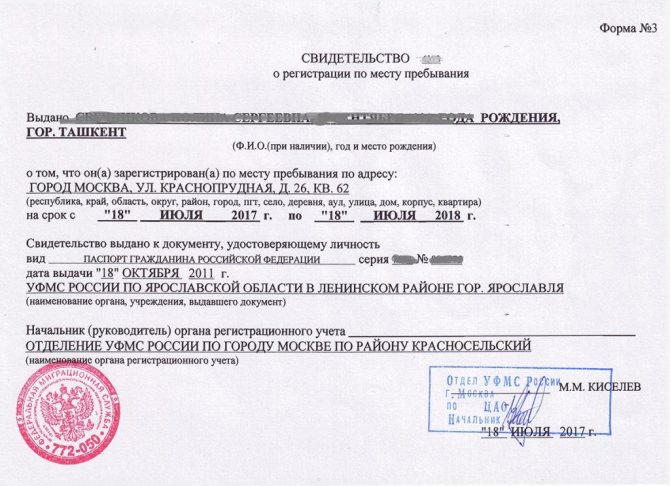
When applying to the Ministry of Internal Affairs, you must have a temporary registration with you
At its core, deregistration, in contrast to a change of registration, is only informing the Main Directorate for Migration Affairs that such and such a person is changing his location.
Return to contents


